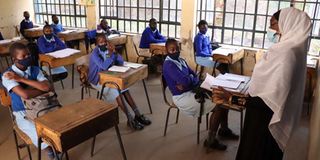We should not rush to reopen schools, colleges

Pupils at Olympic Primary School in Nairobi follows a lesson from their teacher Ms Rukiya Mohamed on Monday, October 12, 2020. The government announced the phased reopening of schools on October 12, 2020, after a seven-month closure to prevent the spread of Covid-19.
What you need to know:
- Covid-19-related hygiene and social distancing norms in schools are unearthing a range of systemic problems with school infrastructure.
- The Ministry of Education ought to provide a workable, practical and all-embracing guidelines and protocols before reopening schools.
As the government steps up plans to fully reopen education institutions amid the Covid-19 pandemic, there is an utmost need to be cautious and careful not to break the smoked fish while trying to bend it.
Stringent guidelines were necessary so that the coronavirus containment efforts are not jeopardised. But experiences from the past few days of the partial reopening point to the precariousness of the decision if video and pictorial pieces circulating on social media platforms are anything to go by.
From the perspective of two of the most important measures cited by global and local health authorities to prevent the spread of Covid-19 — frequent and proper hand washing and social distancing — the state of school infrastructure exposes the underbelly of the education sector.
Notably, Covid-19-related hygiene and social distancing norms in schools are unearthing a range of systemic problems with school infrastructure across the world.
From schools in densely populated urban areas to remote rural ones , some of which are submerged in floodwater, schools face a wide range of challenges in their provision of adequately protective Covid-19 environments.
Inadequate physical conditions — such as water shortage, poor sanitation and small classrooms, a major problem for the education sector — seem difficult to overcome in the short term for an immediate response.
Although it would be frivolous to imply a causal link between school reopening and Covid-19 cases, experiences of other countries such as South Africa shows that sending multiple year-groups back to school with the coronavirus numbers seemingly on the rise at an alarming rate makes it extremely difficult to meet the basic safety protocols.
Issues of teacher availability, community engagement and measures to ensure the most vulnerable children are protected further compounds the challenges.
Not a good idea
School reopening in the midst of the pandemic may not be a good idea. Two weeks after Israel reopened schools in May, a Covid-19 outbreak, including at least 130 cases at a single school, resulted in the reversal of the decision.
In South Korea, some 250 schools near the capital Seoul were closed on May 28, just days after they reopened, following a spike of 79 cases.
In Florida, a month after a forced reopening, dozens of classrooms were temporarily shut down after spikes in cases and infections among school-age children by up to 34 per cent.
Understandably, there exist strong health, psycho-social and economic arguments for school reopening against intense pressure on the government to make the right decisions.
Nevertheless, there is a need to comprehensively review evidence from elsewhere and flexibly respond and adapt to the situation.
The Ministry of Education ought to provide a workable, practical and all-embracing guidelines and protocols before reopening schools.





